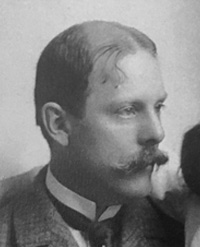Tilden Russell Selmes, Jr.
(1853 – 1895)
 Tilden Russell Selmes was born in 1853, the eldest son of Tilden R. and Sarah Benton Selmes. His father was an English immigrant whose first wife had died. As a widower with a married daughter by the time of his 1850 marriage to Sarah, he was quite a bit older than she. Tilden, Jr. was born in Hannibal, Missouri, where his father had become a wealthy merchant and banker who was prominent for his role in outfitting the pioneers who ventured on the overland trails west. During the Civil War, at the urgings of his wife, Tilden’s father moved his family to Chicago to escape the violence of Missouri while he joined the staff of General William T. Sherman. Following a lengthy illness that involved lung problems and was connected to his military service, he died in 1870 leaving his wife with three children – Mary, Tilden, and Lily. Prior to his death three other children – Frank, Nancy, and Spencer – had died.
Tilden Russell Selmes was born in 1853, the eldest son of Tilden R. and Sarah Benton Selmes. His father was an English immigrant whose first wife had died. As a widower with a married daughter by the time of his 1850 marriage to Sarah, he was quite a bit older than she. Tilden, Jr. was born in Hannibal, Missouri, where his father had become a wealthy merchant and banker who was prominent for his role in outfitting the pioneers who ventured on the overland trails west. During the Civil War, at the urgings of his wife, Tilden’s father moved his family to Chicago to escape the violence of Missouri while he joined the staff of General William T. Sherman. Following a lengthy illness that involved lung problems and was connected to his military service, he died in 1870 leaving his wife with three children – Mary, Tilden, and Lily. Prior to his death three other children – Frank, Nancy, and Spencer – had died.
Tilden graduated from Yale University with a law degree and chose to start his career in St. Paul, Minnesota, as a partner in the firm of Selmes and Blaine (the son of the presidential candidate, James G. Blaine). It was during this time that he became acquainted with Patty, the eldest child of Charles Flandrau. Patty was quite a belle in St. Paul society but since she never mentioned Tilden in letters to her aunt, Julia Dinsmore, it is likely that he did not make much of an impression on her until later. In 1878, Tilden purchased a ranch near Mandan, North Dakota, which he called Chanta Wapka, and he used his earnings at the law firm to stock the ranch. The Dakota Territory, in the 1870s and 1880s was a frontier in transition. Exaggerated advertisements in newspapers and books like The Beef Bonanza; or How to Get Rich on the Plains, by James S. Brisbin, encouraged many wealthy (and not-so-wealthy) easterners and even foreigners to invest in cattle and sheep ranching on the Dakota Plains.1 The most notable among these was Theodore Roosevelt, who purchased two ranches in the early 1880s, but the Vanderbilt and Rockefeller families also sent some of their fortunes west to see if they could make a profit. Tilden Selmes was among this group of well-educated businessmen who went west in search of riches and excitement, although he knew very little about managing a ranch.
Charles Flandrau had encouraged his daughter to wait until she was twenty-one to marry. Eight years her elder, Tilden must have seemed a good catch – a Yale graduate, a lawyer, and an outdoorsman. His reserved personality was attracted by Patty’s gregarious nature and in 1882 he began to seriously pursue her. It was only a matter of days after her twenty-first birthday when Patty announced her engagement. Although her father may have been pleased to have her financial woes become someone else’s problem, he would later realize that her new husband was no better with money than she was. The wedding took place on June 7, 1883 in the parlor of the house in Boone County – the same room in which Patty’s mother was married. For her bouquet she chose the small white roses that her grandmother, Martha Macomb Dinsmore, had brought with her from Louisiana in 1842.
The couple moved to their ranch near Mandan, where Tilden was already feeling the whine of the creditors. Patty, on the other hand, was trying to decide if two servants would be enough to take care of her or if she needed three. Julia was quite insistent that she should not go overboard and so she settled for two servants, one of whom stayed with the family for decades, Julia Farley Loving. Tilden took up his law practice in Mandan to try to make ends meet and Julia Dinsmore even helped out by loaning them money. On the rare occasions when Tilden had time off, he and his wife would go camping in the Badlands or visit their neighbors, the Marquis de Mores and Theodore Roosevelt.
In August 1885, Patty realized that she was pregnant. Although she was anxious about the possibility that the experience of childbirth might leave her dead or weak for the rest of her life, she resigned herself to do what was seen as her duty. She visited St. Paul on her way to Boone and arrived there by late 1885. Tilden did not want her out at the ranch when the baby came, so although he did not want to be alone, he felt better with her at Aunt Julia’s. On March 22nd, 1886, with the help of Patty’s uncle, Dr. Thomas Flandrau, a little girl was born in the same corner bedroom where her grandmother had given birth to her mother twenty-five years earlier. Patty let Julia name the infant, and she became Isabella Dinsmore Selmes. When the baby was a few months old, Patty took her back to the Dakotas.
The winter of 1886-1887 was one of the worst in many years. The blizzard of early 1887 ruined the career of many ranchers, Tilden among them. Already in debt, he now made the decision to give up on trying to become a successful rancher, and returned with his family to St. Paul. Patty was certainly happier in St. Paul, although her happiness quickly translated into spending more money. Once again, her “want of economy” became the main topic of conversation for the extended family. Patty wanted Julia to talk to her father about helping Tilden out in a business way by sending clients his way. She also thought her father should buy a house for her family, since they were having financial troubles. Julia, who had already given the couple money, wrote Patty, “I feel sure your papa will never really help you until he sees that you have come to understand Til’s financial condition and [are] determined to help him yourself.”2 After much persuasion, Charles did purchase a house for his daughter and son-in-law, though they only lived there for four years.
To make matters worse, Tilden seemed to be suffering from some sort of nervous disorder. Sometimes he had carbuncles on his back and other times he complained of ulcer-like conditions. In early 1895, Patty was determined to find the cause of his pain. First she took him to the Good Samaritan Hospital in Cincinnati. Although the doctor there diagnosed his condition as ulceration of the stomach, he changed his mind several times afterward, causing Patty to lose faith in him. She then took Tilden by train to Johns Hopkins Hospital in Baltimore. His extended family and friends made the trip also. Julia Dinsmore visited from Kentucky, Charlie Flandrau came down from Harvard, and Teddy Roosevelt even came from New York. The doctors discovered a tumor in Til’s liver and only gave him a few months to live. After an operation, Tilden made the painful trip to Julia’s house in Boone County where he chose to spend the last days of his life. The nine-year-old Isabella came down from St. Paul and did her best to raise her parents’ spirits and Tilden’s mother and sister, Mary, visited from Massachusetts.
Sally described Tilden during his last months of life as being clear-minded and cheerful: “There is nothing he hasn’t thought of and planned to the least.... I never knew so unselfish a man. He is just like himself – still planning for everyone's pleasure and happiness all the time. He has never complained.” 3 Tilden left Patty a life insurance policy worth $11,000, and he asked that for at least part of the year Isabella’s home be with Rebecca Flandrau, who would be able to provide her with a fine example to try to live up to. Patty’s father agreed to take care of the hospital bills and to allow her to rent out the house he had eventually bought for them and collect the rent as income. With everyone taken care of, Tilden died on August 1, 1895 and was buried in the family graveyard on the hill. Patty wrote that “For the first few days I felt almost happy in the thought that my poor boy was at last out of his terrible suffering and at rest – and now that feeling is being replaced by the one of utter loneliness – and heartache which I feel I must always have.” 4 She planted her grandmother’s white roses near where Tilden’s head lay.
1 William H. Forbes and the editors of Time-Life Books, The Old West: The Cowboys (New York: Time- Life Books, 1973), 62.
2 Julia Dinsmore to Patty F. Selmes, 25 April 1888.
3 Sally F. Cutcheon to Charles M. Flandrau, 6 May 1895.
4 Patty F. Selmes to Rebecca Flandrau, 6 August 1895.
